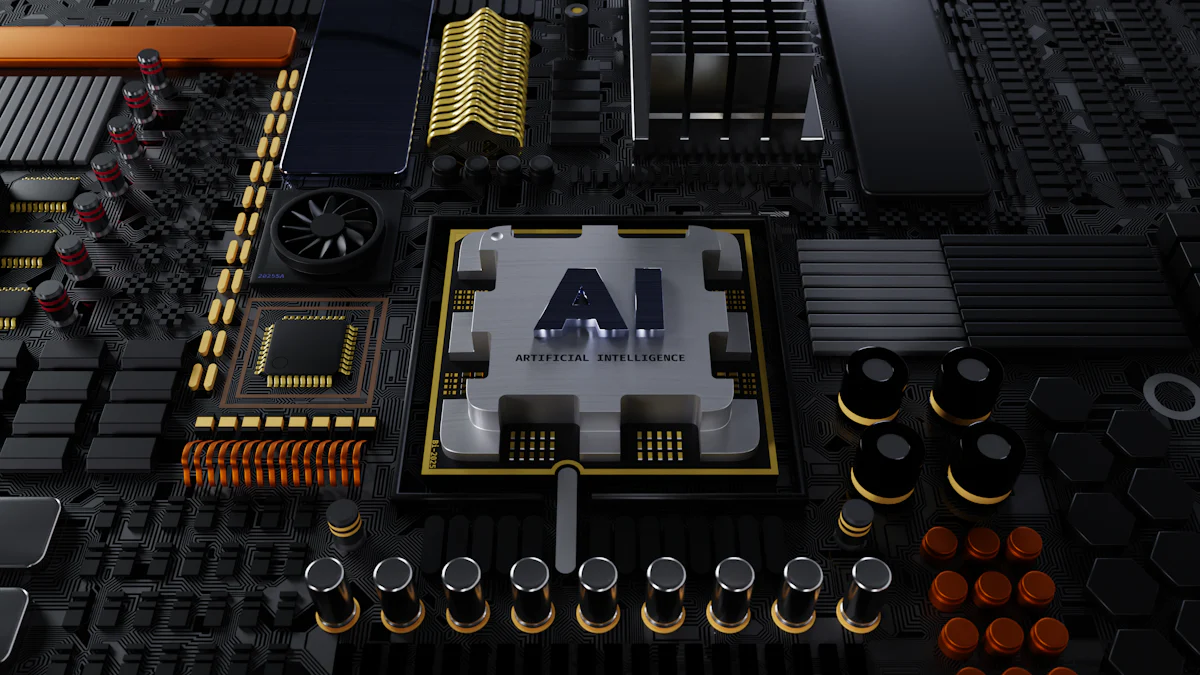How to Kickstart Your AI Automation Agency Journey

AI automation transforms businesses by streamlining operations and enhancing efficiency. The rise of AI automation agencies marks a pivotal shift in how companies integrate these technologies. These agencies offer tailored solutions, enabling businesses to harness AI without needing deep technical expertise. The market potential is vast, with projections showing the AI market could reach $826 billion by 2030. This growth presents lucrative opportunities for those ready to dive into the AI automation agency landscape. Embrace this future and position yourself at the forefront of innovation.
Understanding AI Automation
Key Concepts in AI Automation
What is AI?
Artificial Intelligence (AI) refers to the simulation of human intelligence in machines. These machines perform tasks that typically require human intelligence. AI encompasses a wide range of technologies, including machine learning, natural language processing, and computer vision. Each technology contributes to the ability of machines to learn, reason, and make decisions.
How AI is used in automation
AI plays a crucial role in automation by enabling machines to perform repetitive and complex tasks. AI-driven solutions such as chatbots, content generation systems, and AI workflows automate tasks and improve efficiency. Businesses use AI to enhance customer experiences and streamline operations. AI automation reduces manual effort and increases productivity across various sectors.
The Role of AI in Modern Businesses
Benefits of AI automation for businesses
AI automation offers numerous benefits to businesses. Companies experience increased efficiency and reduced operational costs. AI enhances decision-making processes by providing data-driven insights. Businesses gain a competitive edge by implementing AI-powered solutions. Customer experiences improve through personalized interactions and faster response times. AI automation enables businesses to focus on strategic initiatives rather than routine tasks.
Examples of AI automation in various industries
AI automation finds applications in diverse industries. In healthcare, AI assists in diagnosing diseases and managing patient records. The finance sector uses AI for fraud detection and risk management. Retail businesses implement AI for inventory management and personalized marketing. Manufacturing industries benefit from AI in quality control and predictive maintenance. AI automation transforms traditional business models by integrating advanced technologies into everyday operations.
Setting Up Your AI Automation Agency

Embarking on the journey to establish an AI automation agency requires a strategic approach. You must acquire essential skills and knowledge to navigate this innovative field. A well-crafted business plan will guide your agency toward success. The following sections will provide valuable insights into these foundational elements.
Foundational Knowledge and Skills
Essential skills for starting an AI automation agency
To thrive in the AI automation industry, you need a robust skill set. Proficiency in machine learning, data analysis, and programming languages like Python is crucial. Understanding AI algorithms and their applications will enhance your ability to deliver effective solutions. Strong problem-solving skills will enable you to tackle complex challenges that arise in AI projects. Communication skills are vital for conveying technical concepts to clients and stakeholders.
Expert Testimony:
Cybersecurity Analyst: "These professionals’ ability to identify and counter AI-driven threats hinges on this expertise."
Adopting a proactive approach to learning will position your AI automation agency as a leader in the field.
Resources for learning AI and automation
Numerous resources can help you build the necessary expertise for your AI automation agency. Online platforms like Coursera and edX offer courses in AI and machine learning. Books such as "Artificial Intelligence: A Guide to Intelligent Systems" provide comprehensive knowledge. Attending workshops and conferences will keep you updated on industry trends. Engaging with online communities and forums will allow you to exchange ideas with peers. These resources will equip you with the skills needed to excel in the AI automation landscape.
Developing a Business Plan
Identifying your niche and target market
Identifying a niche is crucial for your AI automation agency's success. Focus on industries where AI can create significant impact, such as healthcare or finance. Research market trends to understand the specific needs of potential clients. Tailor your services to address these needs and differentiate your agency from competitors. A clear understanding of your target market will guide your marketing and outreach efforts. This strategic focus will attract clients who value your specialized expertise. Identifying a niche
Creating a value proposition
A compelling value proposition is essential for attracting clients to your AI automation agency. Highlight the unique benefits your agency offers, such as cost savings and efficiency improvements. Emphasize your expertise in delivering tailored AI solutions that meet client needs. Showcase successful case studies and testimonials to build credibility and trust. Clearly communicate how your agency's services align with clients' goals and objectives. A strong value proposition will position your agency as a trusted partner in AI automation.
Tools and Technologies for AI Automation

Essential Tools for AI Automation
Software and platforms for AI development
AI automation requires powerful software and platforms. Anaconda offers a comprehensive environment for Python-based AI development. Practitioners use Anaconda to build and deploy solutions efficiently. Google Cloud Platform (GCP) provides robust tools for AI integration. Organizations leverage GCP for its end-to-end solutions. Amazon Web Services (AWS) delivers scalable AI services. Businesses choose AWS for its flexibility and reliability. IBM Watson excels in natural language processing capabilities. Enterprises utilize IBM Watson for advanced AI applications. Microsoft Azure supports seamless AI deployment. Companies rely on Azure for its extensive AI offerings. Open-source AI platforms democratize technology access. Users harness these platforms for impactful applications.
Tools for managing AI projects
Effective project management ensures AI success. Jira facilitates task tracking and team collaboration. Teams use Jira to streamline workflows and enhance productivity. Asana organizes project tasks and deadlines. Managers implement Asana for efficient resource allocation. Trello visualizes project progress with boards and cards. Teams adopt Trello for intuitive project management. Slack enhances communication among team members. Organizations integrate Slack for real-time updates and discussions. GitHub manages code repositories and version control. Developers utilize GitHub for collaborative coding efforts.
Staying Updated with AI Trends
Importance of continuous learning
Continuous learning drives AI innovation. Professionals must stay informed about emerging technologies. Knowledge empowers individuals to adapt to industry changes. Learning fosters creativity and problem-solving skills. The AI field evolves rapidly, requiring ongoing education. Staying updated ensures relevance in a competitive market. Continuous learning enhances career prospects and opportunities.
Resources for staying informed about AI advancements
Numerous resources keep you informed about AI advancements. Online courses offer structured learning experiences. Platforms like Coursera provide access to expert-led courses. Books deliver in-depth insights into AI concepts. Titles such as "Artificial Intelligence: A Guide to Intelligent Systems" expand understanding. Conferences showcase the latest AI research and developments. Events like the AI Summit connect professionals with industry leaders. Online communities facilitate knowledge exchange and networking. Forums and discussion groups enable engagement with peers. These resources equip you with the knowledge to excel in AI automation.
Challenges and Benefits of Running an AI Automation Agency
Common Challenges
Technical challenges in AI implementation
AI automation agencies face technical hurdles. Implementing AI requires expertise in machine learning and data analysis. Many businesses struggle with integrating AI into existing systems. Technical teams must ensure seamless integration without disrupting operations. AI models need constant updates to maintain accuracy. Agencies often encounter difficulties in managing large datasets. Data privacy and security concerns add another layer of complexity. Addressing these challenges demands skilled professionals and robust infrastructure.
Business challenges in the AI industry
The AI industry presents unique business challenges. Agencies must navigate a rapidly evolving market landscape. Competition intensifies as more players enter the field. Establishing a strong brand identity becomes crucial for differentiation. Agencies need to demonstrate tangible value to attract clients. Pricing strategies require careful consideration to remain competitive. Building trust with clients involves delivering consistent results. Agencies must also manage client expectations regarding AI capabilities. Balancing innovation with practical solutions poses an ongoing challenge.
Benefits of an AI Automation Agency
Potential for growth and innovation
AI automation agencies offer significant growth potential. Businesses increasingly seek AI solutions to enhance operations. Agencies can capitalize on this demand by providing tailored services. AI enables companies to streamline processes and reduce costs. Agencies that deliver innovative solutions gain a competitive edge. The ability to scale operations predictably attracts more clients. Agencies can explore new markets and expand service offerings. Continuous learning and adaptation drive long-term success.
Impact on clients and industries
AI automation agencies transform client businesses. Enhanced customer insights lead to improved decision-making. AI tools predict customer behaviors and trends effectively. Agencies help clients personalize content and improve engagement. Streamlined processes boost efficiency and productivity. Clients experience cost savings and time reductions. AI solutions enhance customer service and satisfaction. Agencies play a pivotal role in helping industries stay competitive. The impact extends across sectors, from healthcare to finance.
Starting an AI automation agency offers exciting opportunities. You can tap into the high demand for AI services. The potential for revenue generation is significant. Specializing in a niche allows you to stand out. Helping businesses improve efficiency and productivity brings satisfaction. Dedication and continuous learning drive success in this field. Embrace the possibilities and take the first step with confidence. Adaptability and growth remain crucial in the evolving AI landscape. Embark on this journey and become a leader in business automation.
See Also
Exploring the AI Automation Firm Landscape: A Manual
Selecting the Top AI Automation Company
How AI Automation Firms Benefit Your Company
Key Markets for Automation Firms in 2024: Areas of Concentration
Effortless Integration of AI Technology for Small Businesses
